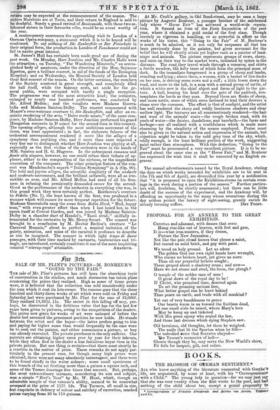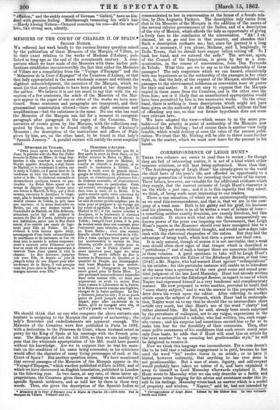B OOKS.
• THE BLOSSOM OF GERMAN SENTIMENT.*
Aix who know anything of the literature connected with Goethe's life, are acquainted., by name at least, with his "Correspondence with a Child." The young lady in question—for we may just say that she was over twenty when she first wrote to the poet, and had nothing of the child about her, except a genial propensity to • Corrapomietace of Priiiiitin a rq,ieend Bettine von Arnim. Trabnar and Co. romp—was a certain Bettine Brentano, who is bettee known by her husband's name, Yon Arnim. She was the daughter- of a Frankfort merchant, of Italian extraction, and the niece of Savigny, and one of her brothers, Clemens Brentano, had a small reputation in his day as a writer of the romantic school. Born in 1785, she grew up amid the wars of the French Revolution, when Frankfort was filled with French Imigres, when German literature was culminating, and when all Europe was fermenting with new ideas. It is scarcely wonderful if a little of this febrile excitement penetrated within the quiet cloister in which Faulein Bettine was brought up. Those were great days for the youth of Germany. The disasters of a misdirected war had only quickened the patriotic sentiment, and everywhere brothership was being sworn by excited students, secret con- federations were being formed to deliver the enslaved Fatherland, and any product of German thought was welcomed as a pledge of national vitality. Bettine's tastes were literary, and her sentiments a little cosmopolitan. Her friendship with the Canoness Giindemde, a lay member of her own convent, and some ten years older than her- self, has absolutely no political significance. Her letters turn chiefly on her relations to her own family; on literary subjects ; on her dislike of "Philistines," a students' term for respectable common-place people ; on religion, especially one of her own invention ; and onthe general expansiveness of her sentimental faculty. Nevertheless, it is probable that such highly peculiar utterances—to borrow a term from the modern romantic school—could not have been possible even in Germany, except at times when society was a little unhinged. If Diana and her nymphs bathe by open day in the Serpentine, we shall be more apt to think the police at fault than to mistake Hyde Park for Arcadia. Yet, since the impropriety has been committed, and Fraulein Brentano has given us her whole psychological history in her own words, we may fairly take it, with her own qualification, that it is offered "to the good and not to the bad." We may first observe in all sympathy with the heroine, that she when I ask for instruction; breathing upon me, he says, There is was a little unfortunate in her family. It is true, they were wisdom for thee.' " It is pleasant to think that the writer of all highly respectable people by birth and by education, and their house was the meeting-place of some of the best society of the times. But they evidently did not understand the peculiarities of genius. They complained that Bettine "was the most conceited thing under the sun, considering nothing instructive ;" and that "if auy one spoke upon a serious subject, she lay down upon the floor, kicked a little while with her feet, and afterwards dropped asleep, but that any insipid jest would please her." "I ask," Bettine expostulates, "is that conceit ? It rather seems like ignorance that cannot appreciate your enjoyments." "Yes, but conceit is ignorance." "There, thou seest it is the unanimous opinion." Uncle Savigny, whose mind had probably been perverted by his judicial studies, decidedly endorsed this view, and, "with the purest intentions," treated his niece as if she were not quite a responsible being. Even brother Clemens, who passed in the world as highly peculiar, seems to have wanted tolerance for his sister's idiosyncrasies. "Do not become erratic," he observed ; "it frightens one sometimes to think what will become of you." Nevertheless, he admitted that when she spoke she was intelligent, and "solved much of which the philosophers knew nothiug." Franz, another brother, who appears to have been worldly. minded and a Philistine, went so far as to tell his sister that she was generally ridiculed, because Loulou, her younger sister, was married before her, and added, good-naturedly, that had she shown her- self more domestic, she might also have found a husband. Bettine answered thaf it was now too late to mend, and that she preferred not to marry, having had occasion to observe that "where domestic relations are happy, Sunday is spent in counting the neighbours' tiles." Evidently genius hiss its prerogative, and, like the. fairy in a tale, can always lead its favourites out of the per. plexdies; it has entangled them in. We even prefer Bettine's answer on another occasion, where a family friend exhorted her to descend a little more to the level of every-day life. "You are like a young cat running after a mouse ; while we are doing you the honour to talk to you, you are climbing on chairs and sideboards ; you are up before the old family portraits, and seem to pay much more regard to them than to us who are living." "Indeed, Herr van Boatel, that is only because they are so entirely overlooked and forgotten ; nobody speaks to them, and I feel about them as you do about ine. Out of sympathy you talk to me, poor little fledgling that I am, mid that infects me so that I want to show sympathy for these painted big wigs." "Are you crazy? How should you show sym- pathy to an old picture P" "As you show it to me." "But the pictures have no feeling of it." " Ei ! arid I have no feeling of it." "Well, I swear I pity you, you are on the way to the madhouse." On the coutrary, if Bettine's translator, and the (American) Dial which she quotes way be believed, the young girl was on the way to immortality. Philistines must be pardoned if they„are weak in geography and cannot distinguish clearly between Bedlam and Far. mous.
Naturally. Bettine turned to other occupations and persons for the comfort which was denied her in her home life. Her catholicism seems to have been worn lightly. She tells us of one highly original confession, that she had always wondered why the three Eings did not take the Holy Child back with them to the East, instead of leav- tug it in the stable- The priest agreed with her that they were negligeut, worldly men, but added that the doubt was not worth confessing, and that God would not care a straw for it. Giinderode Proved a more sympathizing confidante. This young lady is de- scribed in one of the letters, in the words of Clemens, as "pure,
peetie, penetratiug •the senses ;" she was also "clear as the
moon," yet with "a flighty, unsettled manner at times," like " clouds God, we have no terms in our language,—the expansiveness of /much
passing over and obscuring the moon." She had devoted herself "to an inward life," and wrote poems which were "like music of the soul ;" "and this was but the prelude of the sours concert, because ever and on all sides melodies were unfolding." Apparently, the higher regions of psychology are well stocked with musical-boxes. Elsewhere we learn that Gituderode was a tall and rather stiff-look-. ing young lady, very reserved, morbidly self-conscious, in practice more passionate, and in little matters more sensible than Bettine. She often remonstrates with her friend on her untidy habits and unsteady mind, but she seems on the whole to have been overpowered by the stronger organization, and to have accepted Bettine's Sehwebe- Religion, which, for want of a better word, we must call the religion of hovering. This new faith appears to have been developed in the process of climbing trees, mounting ladders, and dancing, especially at night, about walls ; amusements, or perhaps we should say devotional exercises, to which Bettine seriously inclined, and which she con- tinued till she was twenty-six or twenty-seven at least, with some detriment to her dresses. The practical points of the creed, as Glade- rode summed them up, are, that its founder took all humankind upon herself ; that she would let it live on air, and grope in the darkness of uncultare ; that she would eschew boiled food, and live entirely on raw carrots and onions, throwing roasting-spits to the devil; and, lastly, that she would hover, which we presume means clamber. But the faith had deeper mysteries than this, which must be given in Bettine's own words : "Think as I will, nothing seems so sweet to me as lying in the shade of yonder great linden, beneath its falling blossoms, and through its rustling branohes to watch for the loved one, the Holy Ghost. He is my lover coming to visit me, now in the hot season, when I am lounging in the thicket shade, where the linden blossoms are raining down upon me with every soft breath. Oh, he makes no show of wisdom, of theological learn- ing, of virtue and religion. I suit him as I am, and he laughs at me this was neither denounced as a heretic or shut up m a lunatic asylum. With a little persecution, the Seiseebe religion might, perhaps, have made proselytes. It is certainly not more absurd than half a dozen which have captivated society. But we fear the true secret of hovering has perished with the founder. We must leave a profound disquisition on kissing—showing that it is identical with language, and that its object is to touch the soul —and pass on to notice one or two minor points. We regret to say that the Schwebe religion appears to proscribe marriage. "People here call loving, wanting to marry,'" Bettine once says, con- temptuously; and on another occasion, she objects to the old alliance of Perseus and Andromeda "/low could a God-youth be Philistine enough to wed?" Alas, later on, she discovered that "the whole world consists of Philistines, and they find no peace till they have dragged the whole world down to their level." "Tell me," she says elsewhere, "when does a Philistine ever stop before the budding Times, awed in prayer for the awakening bud ?" When indeed? Unhappily, besides married people and prosaic people, professional people, especially teachers, seem to belong to that mysterious nationality. "I think one would rather forfeit eternal life than impart one's knowledge over and over again, transmitting it to posterity; we must abdicate it some time—is it not so ? Should one desire to take the old thesis into eternity." We are haunted by a vague fear that we arc Philistines. In her desire to escape from all such, Bettine was possessed by a perpetual fever for hero-worship. Once we find her longing to go and visit HOlderlin, the poet, who had gone mad through a guilty and unfortunate passion. Bettine regarded his adulterous love as an artistic necessity, and thought the man ought to be cared for, "like a holy trust of God, by the nation." Allowing for her utter want of reflection, and for the something noble in her sympathy with disgrace and ruin, the sentiment was yet a dangerous one. A few years later her passionate admiration was accepted by Goethe, and judging by her own account, the connexion cannot have been pro- fitable to either of them. She was jealous, unwise, and it must be added—indelicate; he in his serene selfishness played with her, petted and spoiled her, and at teat turned to a newer and younger admirer.
Our criticisms may seem harsh. We certainly have not cared to dwell upon the real merits of these letters—a certain freshness of style and originality of thought. These have procured the book acceptance with a small circle, and have carried it to an English translation at a time when it is forgotten in Germany. Yet the sort of nonsense which it contains is very far from being innocent. The American translator, who has done her work well enough on the whole, prudently omits all mention of Fraulein Giinderode's death. Disgusted by a quarrel with her lover, and having always held that it was not worth while to outlive youth, she committed suicide after several months' premeditation. Bettine did not profit by the shock of her friend's loss. She was occupied -by her new devotion to Goethe and his mother ; the irritable craving for sensations grew, as it was adroitly ministered to by the poet ; and having paraded the passion of an artificial child- hood before the world, she amused the public, when she had reached the mature age of fifty, by a little fresh philandering with a fool half her own age. Her moral fibres had been blunted by factitious emo- tions, and scorn for blockheads had ended in becoming something like shameless want of reserve. That she had in her u spark that might have been genius, that she belonged to an honourable family
and had mixed with 'the wise and good, only made her follies more conspicuous. At a time when the worst rant of Germany is con- stantly being transfused into our literature, it is a public duty to exptse all shams. The various kinds of sentiment—for which, thank " eff usion," and the sickly conceit of German " Gefiihl," have no kin- dred with genuine feeling. Marlborough treasuring his wife's hair —Hardy kissing Nelson—Ormond mourning his son—did the acts of love, like strong men, silently.
































 Previous page
Previous page